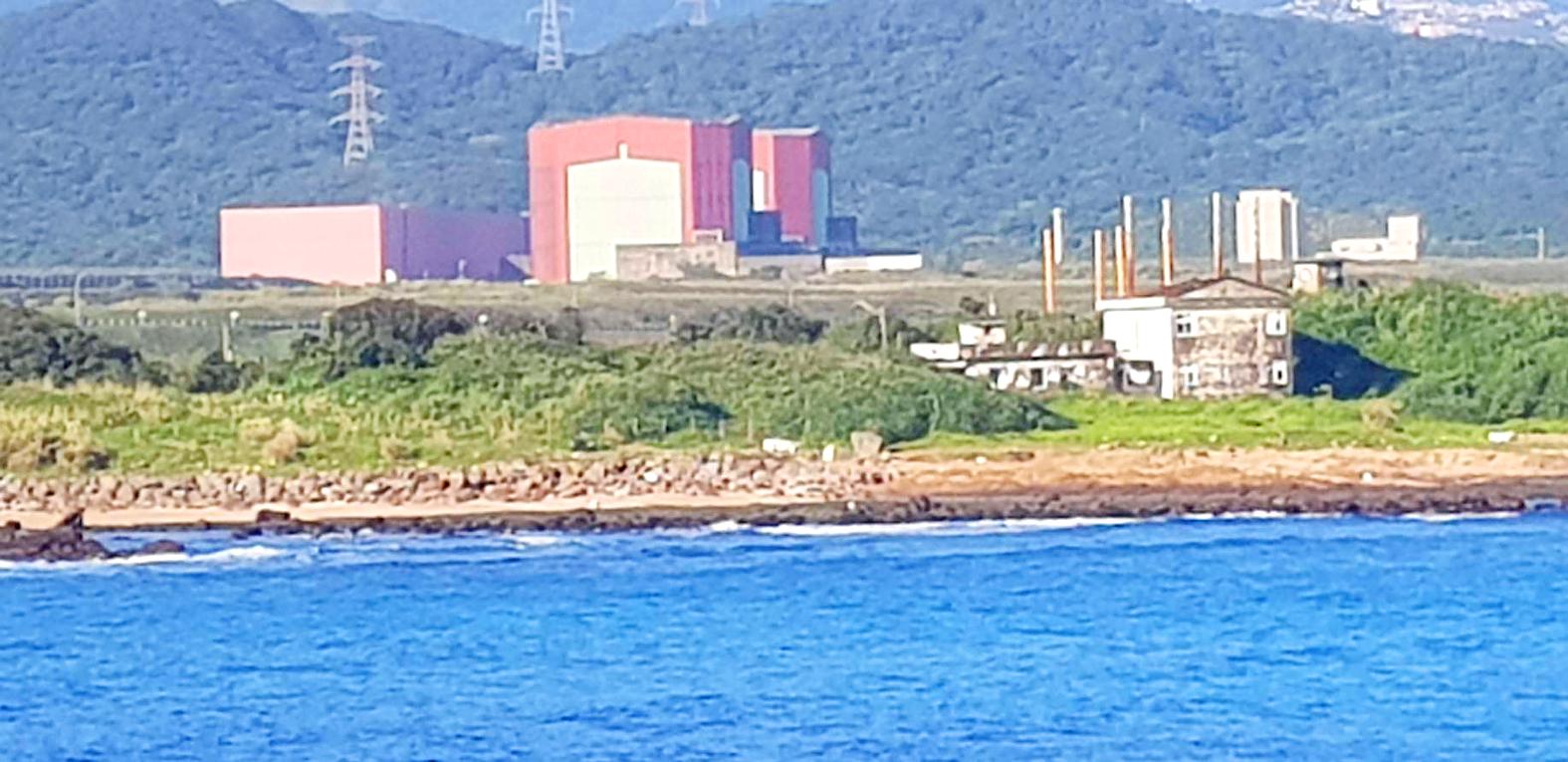The No. 1 reactor at the Guosheng Nuclear Power Plant in New Taipei City’s Wanli District (萬里) is to be shut down today after producing power for 40 years, Taiwan Power Co (Taipower, 台電) said yesterday.
The generator’s 40-year operating permit expires at the end of this year, but as the facility’s spent fuel storage is full, the 985 megawatt reactor would be shut down earlier in preparation for a major overhaul of the facility, the utility said.
Due to the shortage in storage space, Taipower reduced the plant’s power generation capacity by about 20 percent since late February.

Photo: Yu Chao-fu, Taipei Times
The overhaul is expected to take six months and decommissioning of the No. 1 reactor would begin thereafter, Taipower said.
The plant’s second reactor is scheduled to operate until March 2023 when its operating permit expires, it said.
The administration of President Tsai Ing-wen (蔡英文) is committed to phasing out nuclear power generation by 2025 and replacing it with renewable sources of energy. It aims at an energy mix of 20 percent energy production from renewable sources, 50 percent from liquefied natural gas and 30 percent from coal.
Nuclear power accounted for about 11.2 percent of the nation’s energy production last year, down from a peak of 16 to 19 percent.
The Ministry of Economic Affairs said that other energy sources, including natural gas, and solar and hydro power, would in the short term make up for the energy produced by the No. 1 reactor at the Guosheng plant.
Taipower first proposed the reactor’s decommissioning three years ago, gaining approval from the Atomic Energy Commission in October last year.
The plan included the construction of a dry storage facility for used fuel.
However, the establishment of the facility might be delayed by a dispute between the New Taipei City Government and Taipower.
New Taipei City has yet to issue a permit for the storage of the reactor’s fuel rods, as it is opposed to a permanent spent fuel storage facility within its jurisdiction.

In Italy’s storied gold-making hubs, jewelers are reworking their designs to trim gold content as they race to blunt the effect of record prices and appeal to shoppers watching their budgets. Gold prices hit a record high on Thursday, surging near US$5,600 an ounce, more than double a year ago as geopolitical concerns and jitters over trade pushed investors toward the safe-haven asset. The rally is putting undue pressure on small artisans as they face mounting demands from customers, including international brands, to produce cheaper items, from signature pieces to wedding rings, according to interviews with four independent jewelers in Italy’s main

Macronix International Co (旺宏), the world’s biggest NOR flash memory supplier, yesterday said it would spend NT$22 billion (US$699.1 million) on capacity expansion this year to increase its production of mid-to-low-density memory chips as the world’s major memorychip suppliers are phasing out the market. The company said its planned capital expenditures are about 11 times higher than the NT$1.8 billion it spent on new facilities and equipment last year. A majority of this year’s outlay would be allocated to step up capacity of multi-level cell (MLC) NAND flash memory chips, which are used in embedded multimedia cards (eMMC), a managed

In the wake of strong global demand for AI applications, Taiwan’s export-oriented economy accelerated with the composite index of economic indicators flashing the first “red” light in December for one year, indicating the economy is in booming mode, the National Development Council (NDC) said yesterday. Moreover, the index of leading indicators, which gauges the potential state of the economy over the next six months, also moved higher in December amid growing optimism over the outlook, the NDC said. In December, the index of economic indicators rose one point from a month earlier to 38, at the lower end of the “red” light.

The global server market is expected to grow 12.8 percent annually this year, with artificial intelligence (AI) servers projected to account for 16.5 percent, driven by continued investment in AI infrastructure by major cloud service providers (CSPs), market researcher TrendForce Corp (集邦科技) said yesterday. Global AI server shipments this year are expected to increase 28 percent year-on-year to more than 2.7 million units, driven by sustained demand from CSPs and government sovereign cloud projects, TrendForce analyst Frank Kung (龔明德) told the Taipei Times. Demand for GPU-based AI servers, including Nvidia Corp’s GB and Vera Rubin rack systems, is expected to remain high,